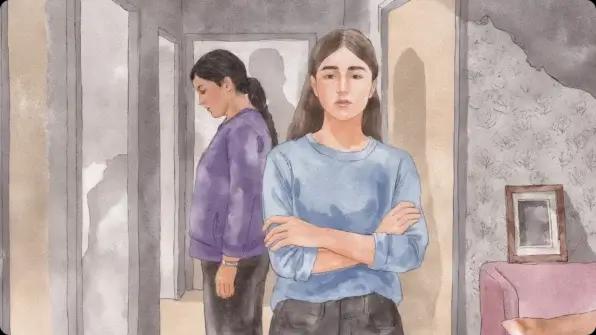The world shatters when someone you trust betrays you. It’s not just a broken promise; it’s a violation that leaves an emotional wound. We are talking about betrayal trauma, which is way deeper than a simple misunderstanding.
Does this resonate with you? Take a test to learn how feeling betrayed can impact your life and discover its common symptoms.
What is Betrayal Trauma?
Developed by psychologist Jennifer Freyd, betrayal trauma theory suggests that a significant betrayal of trust by someone we depend on, like a parent or caregiver, can be highly damaging and may throw our world off balance.
Betrayal trauma can stem from any relationship where trust is broken. It can involve parents, caregivers, friends, or romantic partners. Early experiences of emotional attachment trauma, such as emotional abuse, emotional neglect, or any other act that breaks a child’s sense of safety and trust, may manifest as childhood trauma.
For instance, imagine your best friend laughing with you in private, then acting cold or making passive-aggressive jokes about you in front of others. Or imagine a partner who has hidden a secret relationship for years. Those are examples of betrayal.
Or, a childhood with unfulfilled promises, like a trip to the amusement park that never happened, might make someone more susceptible to partners who disappoint by repeatedly canceling plans.
Impact of Betrayal Trauma
The child, unable to handle the pain of repeated family betrayal, unconsciously buries these memories, contributing to repressed childhood trauma.
In adulthood, You may start questioning everything, even your own sanity. “Did I miss something? Is this even real?” But deep inside, you already know the truth. You are just not ready to admit it yet. Eventually, this experience might leave you struggling to rebuild trust and believe in yourself and others.
This can lead to a phenomenon called “betrayal blindness,” where we unconsciously fall into patterns of accepting disappointment in our adult relationships.
Imagine a partner who constantly lets you down, but you keep making excuses for them, brushing it off as them being busy. This is how you may dissociate yourself from the trauma and live as if nothing had happened.
Do I Have a Betrayal Trauma? Check Out 24 Symptoms
Here’s a look at 24 common symptoms:
Emotional symptoms of betrayal trauma:
- Helplessness. You may feel powerless and unable to control the situation.
- Feeling anxious. Constant anxiety and nervousness about the future or potential threats.
- Depression. Feelings of sadness, loss of interest, asking yourself, “Am I lazy or depressed?”
- Mood fluctuations. Betrayal trauma may cause rapid shifts in emotions, resulting in intense highs and lows.
- Rage. Uncontrollable anger might also stem from the betrayal trauma in any relationship. You may also ask yourself, “Why am I so angry for no reason?”
- Blaming yourself. Feeling guilty for the betrayal, even if it wasn’t your fault.
- Confusion. Difficulty understanding what happened and why.
- Dissociation. You are feeling disconnected from your body or surroundings as a way to numb the emotional pain from betrayal trauma.
- Difficulty trusting others. Believing everyone will betray them makes it hard to form new relationships.
Cognitive symptoms of betrayal trauma:
- Intrusive thoughts and images. Repetitive thoughts and mental pictures of the betrayal.
- Nightmares or flashbacks. Vivid dreams or re-experiencing the betrayal trauma in waking moments.
- Difficulty concentrating. If you find it difficult to focus on tasks or complete daily activities due to overwhelming emotions, you may often wonder, “Why can’t I focus?”
- Negative beliefs about yourself and others. Developing negative views about oneself (“I’m unworthy”) or others (“Everyone betrays”).
Behavioral symptoms of betrayal trauma:
- Unhealthy attachment style. A dismissive avoidant attachment style might be another symptom of betrayal trauma, where you crave independence and avoid intimacy.
- Fear of betrayal. Avoiding reminders of the betrayal or increased isolation.
- Hypervigilance. Constantly on guard, scanning for signs of danger or betrayal.
- Substance abuse. Using alcohol or drugs to cope with the emotional pain.
- Self-harm. Engaging in behaviors that cause physical injury as a way to manage emotions.
Physical symptoms of betrayal trauma:
- Sleeplessness. Difficulty falling asleep or staying asleep.
- Unhealthy eating patterns. Trauma may be a cause for eating disorders, such as overeating or undereating, which might also be a sign of a daughter of an almond mom.
- Fatigue. Feeling constantly tired and drained.
- Chronic pain. Experiencing persistent aches and pains in your body.
- Stomach problems. Digestive issues like nausea or diarrhea.
- Weakened immune system. Being more susceptible to illnesses.
It is important to note that not everyone who experiences betrayal will develop betrayal trauma. However, if you are struggling with some of these symptoms, it is important to seek professional help. A therapist can help you understand your experience and develop healthy coping mechanisms.
4 Types of Betrayal Trauma
Betrayal trauma is a complex emotional response to a violation of trust by someone close to you. It can be caused by a single event, like infidelity, or by repeated experiences of abuse or neglect. Here are the four main types of betrayal trauma:
- Parental betrayal trauma: This occurs when a parent or caregiver, someone you depend on for your basic needs and safety, betrays that trust. For example, a parent who dismisses a child’s reports of abuse from another adult.
This can also take many forms, including abuse, neglect, or abandonment.
- Intimate partner betrayal trauma: This type of trauma is caused by a violation of trust by a romantic partner. This can include infidelity, emotional or financial abuse, or any other harmful behavior from the partner. As an example of betrayal, an intimate partner may use financial control as a form of abuse, keeping their partner dependent and isolated.
- Institutional betrayal trauma: You may feel betrayed when a system or institution that is supposed to protect you fails to do so. This can include abuse in schools, religious organizations, or the justice system. For example, a law enforcement officer disregards domestic violence.
- Interpersonal betrayal trauma: This type of trauma can happen in any close relationship, such as with a friend, coworker, or neighbor. It can be caused by various behaviors, such as lying, cheating, or breaking trust.
Signs of Betrayal in a Relationship
Here, we’ll explore some common signs to watch out for, categorized by relationship type. You can also use them as a brief betrayal trauma survey to identify if you’ve experienced any signs of betrayal trauma.
1. Signs of betrayal in any relationship:
- Shifts in communication: This could be secrecy, defensiveness when asking questions, or general avoidance of specific topics. Are they less open and honest than usual?
- Emotional distance: Do they seem less interested in you or your feelings? Has there been a gradual withdrawal? This could also be a sign of betrayal in the relationship.
- Behavioral changes: Are they acting differently than usual? This could be anything from abrupt changes in routine to unexplained absences.
- Broken promises and commitments: Can you no longer rely on them to follow through on what they say?
2. Signs of betrayal in friendships:
- Gossip and negativity: Do they talk badly about others behind their backs?
- One-sidedness: Is the friendship all about them and their needs?
- Unreliability: Do they frequently flake out on plans or let you down?
3. Signs of betrayal in romantic relationships/marriages:
- Flirting or emotional attachments outside the relationship: This sign of betrayal trauma means emotional affairs or inappropriate closeness with someone else. Is your partner showing unusual interest in someone else or spending excessive time with them?
- Lying or cheating: This can be about anything, not just physical infidelity. Has your partner been dishonest with you about their whereabouts, activities, or feelings? This is the case when you might get partner betrayal trauma.
4. Betrayal trauma in families:
- Favoritism: Does someone feel like they are constantly being mistreated compared to others in the family? You may definitely feel betrayed by the family.
- Broken confidences: Did your caregiver share your secret with others?
- Exclusion: Are you intentionally left out of family events or activities? When your family betrays you, you might be feeling abandoned and lonely.
How many of these signs of betrayal trauma resonated with you? These signs don’t necessarily mean someone is betraying you.

How to Deal With Betrayal
Betrayal can leave you reeling. Here are some tips that might help you start trauma recovery:
- Acknowledge it happened: don’t try to minimize what happened. Pushing down your emotions won’t make them disappear. Allow yourself to feel the hurt, anger, or sadness that arises. It’s a sign you care.
- Feel your emotions: Betrayal trauma may trigger a range of emotions—anger, sadness, even shame. These feelings are all valid. Allow yourself to experience them, but don’t let them consume you or control your behavior.
- Practice self-care: Taking care of yourself physically and emotionally is crucial. Eat healthy foods, get enough sleep, and engage in activities that bring you joy. Consider relaxation techniques like meditation or spending time in nature.
- Seek Support: Bottling up your emotions can hinder healing. Reach out to trusted friends, family members, or a therapist. Talking it out can be a powerful way to process what happened and gain a fresh perspective. There might also be betrayal trauma support groups in your area or therapy specializing in this situation.
FAQ
Betrayal trauma can trigger the brain’s threat response system, leading to changes in how you process emotions, memories, and safety. This can cause symptoms like anxiety, hypervigilance, difficulty trusting others, and even physical health problems.
The length of time it takes to heal from betrayal trauma varies depending on the severity of the betrayal, your support system, and your coping mechanisms. With time and effort, it is possible to heal and rebuild trust.
Both betrayal trauma and PTSD can stem from a traumatic experience. However, PTSD often focuses on threats of physical harm, while betrayal trauma emphasizes the violation of trust by someone close. Symptoms can overlap, but the root causes may differ.
The pain of infidelity can lessen significantly over time with healthy coping mechanisms and potentially through couples therapy (if the relationship is salvageable). However, complete healing is a process, and the timeline varies for everyone.
Forgiveness is a personal journey. If you have a betrayal trauma, it’s about releasing yourself from resentment and pain, not necessarily accepting the betrayal. Consider seeking support from a therapist to help you navigate this process.
Disclaimer
This article is for general informative and self-discovery purposes only. It should not replace expert guidance from professionals.
Any action you take in response to the information in this article, whether directly or indirectly, is solely your responsibility and is done at your own risk. Breeze content team and its mental health experts disclaim any liability, loss, or risk, personal, professional, or otherwise, which may result from the use and/or application of any content.
Always consult your doctor or other certified health practitioner with any medical questions or concerns
Breeze articles exclusively cite trusted sources, such as academic research institutions and medical associations, including research and studies from PubMed, ResearchGate, or similar databases. Examine our subject-matter editors and editorial process to see how we verify facts and maintain the accuracy, reliability, and trustworthiness of our material.
Was this article helpful?




